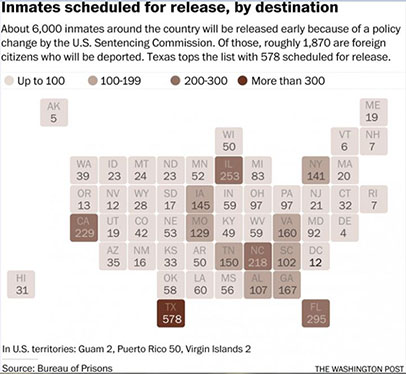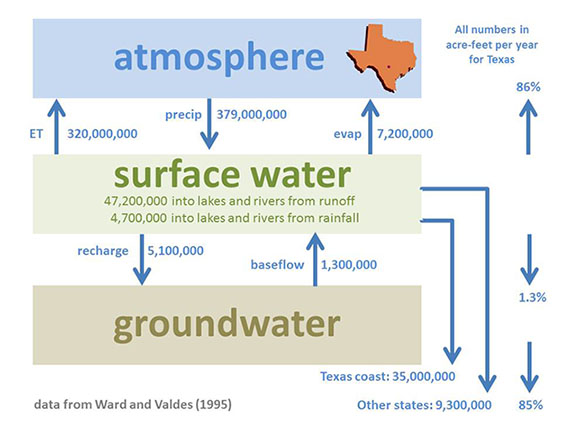- Examine exclusionary discipline practices for pre-K and elementary school students in Texas. (Texas Appleseed, ©2015)
- Review New, Renamed, and Abolished State Governmental Entities 84th Legislature. (Texas Legislative Council, 2015)
- Read about the Mexico Supreme Court granting four individuals the right to grow and smoke marijuana. (Jurist, November 5, 2015)
- Explore a national search engine on corporate misconduct. (Good Jobs First, ©2015)
- "Texas Troopers Ticketing Hispanic Drivers as White," KXAN Investigation, updated November 9, 2015
- Interim Report to the 78th Legislature (Charge 5, Implementation of SB 1074, 77th Legislature, relating to the prevention of racial profiling by certain peace officers), Senate Committee on Jurisprudence, November 2002
- "State Unveils Measures Aimed at Reducing Jail Suicides," Houston Chronicle, updated September 16, 2015
- Invited and Public Testimony on Jail Standards, House Committee on County Affairs, September 15, 2015
- 37 Texas Administrative Code § 273.5, Mental Disabilities/Suicide Prevention Plan, Texas Commission on Jail Standards, amended April 10, 2013
- State Argues We Must Preserve Hazlewood Act for Texas Veterans (Recent News), Attorney General of Texas, November 4, 2015, and Oral Argument Recordings (Docket No. 15-20105, Keith Harris v. Eliseo Cantu, Jr., et al., November 4, 2015), U.S. Court of Appeals for the 5th Circuit
- Keith Harris v. Eliseo 'Al' Cantu of the Texas Veterans Commission, et al., Memorandum and order (Civil action no. H-14-1312; Texas Hazlewood Act), U.S. District Court for the Southern District of Texas, Houston Division, January 26, 2015, and Keith Harris v. Eliseo 'Al' Cantu of the Texas Veterans Commission, et al., Plaintiff's original complaint and application for preliminary injunction and permanent injunction (Civil action no. H-14-1312; Texas Hazlewood Act), U.S. District Court for the Southern District of Texas, Houston Division, May 12, 2014
- Op. Tex. Att’y Gen. No. KP-0015 (2015), Constitutionality of section 54.341 of the Education Code, the Hazlewood Act (RQ-0009-KP), and Op. Tex. Att’y Gen. No. DM-468 (1998), Whether Education Code section 54.203 violates the Equal Protection Clause of the United States Constitution by exempting from dues, fees, and charges at an institution of higher education only those veterans who were Texas citizens at the time they entered the service, and related questions (RQ-937), Attorney General of Texas
- Report on the Hazlewood Exemption: Legislative Policy Report, Legislative Budget Board, December 2014
- Report and Recommendations to the 79th Texas Legislature (Charge 2, Inventory of state veterans' benefits), Senate Committee on Veteran Affairs and Military Installations, December 2004
- Benefits for Veterans, Texas Veterans Portal
- Texas State Veteran's Benefits, Military.com Benefits
- State/Territory Benefits - Texas, MyArmyBenefits.com, U.S. Army
- Texas State Veterans Benefits, NOLO.com
- Compare workers' compensation benefits of various companies in Texas. (ProPublica, October 14, 2015)
- Read a progress update on the Child Protective Services Transformation. (Texas Department of Family and Protective Services, October 2015)
- Review construction reports by legislative district, by TxDOT district, or by contractor name. (Texas Department of Transportation, last updated on October 12, 2015)
- Consider efforts of top law enforcement officials seeking to reduce both crime and mass incarceration. (Brennan Center for Justice, October 21, 2015)
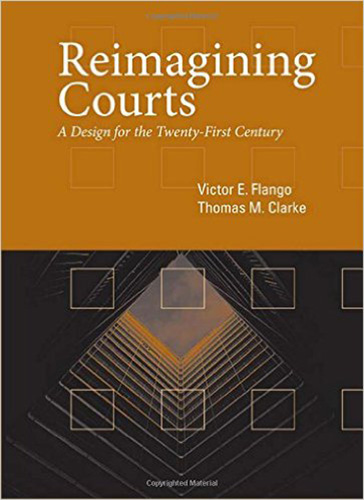
1. Reimagining Courts: A Design for the Twenty-First Century By Victor E. Flango and Thomas M. Clarke
Calls for a re-examination of courts’ essential functions to determine if they are meeting the needs of litigants and to clarify the mismatch between how individuals perceive courts and their actual workloads. Outlines proposals for reform and barriers to their implementation. Offers a comprehensive and integrated redesign of state and local courts to realign and reconcile court duties with different methods of case processing that increase access to justice, improve customer service, and maximize financial resources. Provides examples of courts that are successfully using recommended practices.
Temple University Press, 2015. 215 pages.
347.01 F614R 2015
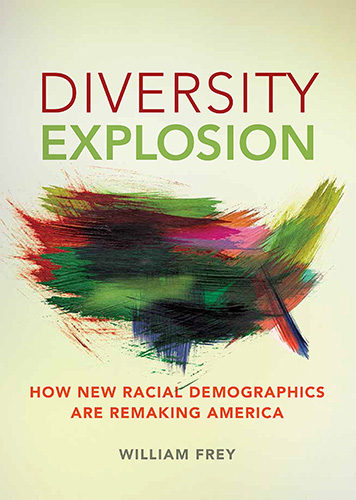
2. Diversity Explosion: How New Racial Demographics are Remaking America By William H. Frey
Explores the transformational demographic change in the United States as a pivotal period for race in America. Discusses the growth of "new minorities," particularly Hispanics, Asians, and multiracial Americans, and their impact on regional shifts, generational change, neighborhood segregation, interracial marriage, and presidential politics. Charts the economic advances of the black population and the reverse migration of blacks back into the South. Includes discussion of various demographic and voter groups in Texas.
Brookings Institution Press, 2015. 301 pages.
305.8 F898D 2015

3. The Rise of Theodore Roosevelt By Edmond Morris
Profiles the pre-presidential life of Theodore Roosevelt, from his birth in New York City through his service as William McKinley's Vice-President. Includes a deeply researched examination of all aspects of Roosevelt's early life, including his time as a precocious child, a Harvard student, a New York State Assemblyman, a rancher & cowboy, New York City Police Commissioner, Lieutenant-Colonel and leader of the "Rough Riders," New York Governor, and Vice President of the United States. Explores Roosevelt's personal life through his relationship with his family, wives, and children, along with the personal and political friendships developed throughout his life and political career.
Random House, 2010. 920 pages.
973.911 R677M
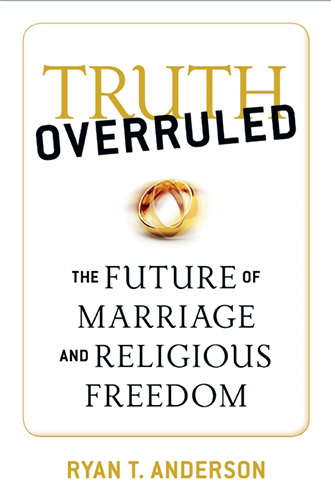
4. Truth Overruled: The Future of Marriage and Religious Freedom By Ryan T. Anderson
Presents the arguments of a Senior Research Fellow at the Heritage Foundation who believes the Supreme Court's Obergefell v. Hodges, same-sex marriage ruling, was "pure judicial activism." Examines the idea of marriage and consequences of its legal redefinition, the idea of religious liberty as an inherent right, and the perception of "defenders of marriage" as bigots. Explains his arguments are based on philosophy, jurisprudence, political science, and social science and that the book provides those who disagree a better understanding of his arguments, and provides those who agree a better understanding of the nature of the debate.
Regnery Publishing, 2015. 256 pages.
306.81 AN24T 2015

5. Picturing Texas Politics: A Photographic History from Sam Houston to Rick Perry By Chuck Bailey
Presents the military, social, and political history of Texas through a kaleidoscope of iconic images and rare photographs that in some cases have never been published. Captures influential and colorful politicians at work, campaigning, or at home to tell the story of Texas politics from the Republic of Texas to modern day. Compliments this unique collection of photographs with chapter introductions and captions written by historian Patrick Cox.
University of Texas Press, 2015. 230 pages.
320.09764 B151P 2015

6. Give Us the Ballot: The Modern Struggle for Voting Rights in America By Ari Berman
Chronicles the events preceding and following the adoption of the Voting Rights Act (VRA) of 1965. Explores the journey America has endured in its search for voting equality for its citizens; from the Martin Luther King, Jr. lead marches in Selma to recent efforts to thwart minorities from voting. Proposes that tactics such as gerrymandering and voter ID laws, passed under the guise of "combating voter fraud," are motivated by politics, meant to suppress minority voter turnout. Suggests that although the VRA was passed 50 years ago, there are still battles to be fought in the quest for voting rights for all Americans.
Farrar, Straus and Girous, 2015. 372 pages.
324.620973 B456G 2015
- An Audit Report on the Texas Emissions Reduction Plan Program at the Texas Commission on Environmental Quality (TCEQ) (SAO Report No. 11-012), Texas State Auditor's Office, December 2010
- TERP Project Summary Reports and Publications, including Summary Reports and Biennial Report to the Legislature, Texas Commission on Environmental Quality, December 2014
- "Oil Field Theft on the Rise in Texas," Inside Energy, March 9, 2015
- Transportation Funding Options: Legislative Policy Report, Legislative Budget Board, February 2015
- Transportation Funding: Understanding Funding in Texas, Texas Department of Transportation, 2014-2015 Edition
- Funding Needs and Potential Sources, Texas Department of Transportation
- Transportation Policy Research Center: Finance and Infrastructure Investment Analysis Program, Texas A&M Transportation Institute
- FY2016 and FY2017 General and Deferred Maintenance Procurement Forecast, Texas Facilities Commission
- Master Facilities Plan Report 2014, Texas Facilities Commission, 2014
- Planning and Real Estate Management Division
Week in Review, October 29th
Oct 29
- Explore how student achievement varies across states. (Urban Institute, October 26, 2015)
- Examine testing in urban school districts. (Council of the Great City Schools, October 2015)
- Consider new policy recommendations related to tobacco and e-cigarettes. (American Academy of Pediatrics, October 26, 2015)
- Assess the vulnerability of automated license plate recognition camera systems. (Electronic Frontier Foundation, October 28, 2015)
Week in Review, October 22nd
Oct 22
- Explore high school graduation rates state by state. (U.S. Department of Education, October 19, 2015)
- Examine payday and auto title loan businesses in Texas. (Texas Appleseed, October 16, 2015)
- Read about the creation of a task force charged with developing recommendations for a registration process for Unmanned Aircraft Systems. (U.S. Department of Transportation, October 19, 2015)
- Track the costs of excessive alcohol consumption. (American Journal of Preventive Medicine, October 1, 2015)
- Amendment language
- What did this amendment do?
- FAQs and training materials
- Materials from public meetings and hearings
- Public comment
- Federal Register notices, court-related materials, speeches, remarks, and press releases.
Week in Review, October 15th
Oct 15
- Read about the retroactive sentence reductions under the 2014 Drug Guidelines Amendment. (United States Sentencing Commission, accessed October 14, 2015)
- Track multi-state arrests of prisoners released in 2005. (Bureau of Justice Statistics, September 2015)
- Explore the consequences of frequent text messaging by adolescents. (Psychology of Popular Media Culture, October 5, 2015)
- Learn about the 158 families contributing millions to Democratic and Republican presidential candidates. (New York Times, October 10, 2015)
Texas Water!
Oct 13
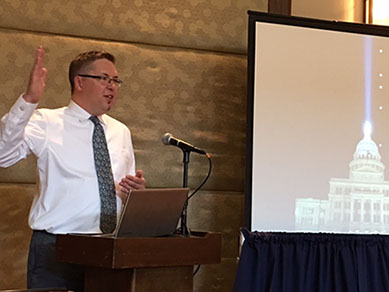
- 86 percent of all rainfall in Texas is evaporated or evapotranspirated ("plant sweat") back into the atmosphere.
- Only 1.3 percent of all the rainfall and surface water runoff actually make it down into the aquifer system.
- 40 percent of all water used in Texas, whether surface water or groundwater, comes from the Ogallala Aquifer in the Panhandle.
- Direct potable reuse: In a first for the United States (and only the second place in the world), Texas has started directly reusing treated wastewater for drinking water. The Colorado River Municipal Water District in Big Spring and the city of Wichita Falls are early adopters.
- Aquifer Storage and Recovery (ASR): This process injects water back into an aquifer for later use. ASR avoids the ravages of evaporation, and has been utilized in San Antonio with transfers from the Edwards Aquifer to the Carrizo Aquifer.
- Desalination: Texas already has over 200 groundwater or surface water desalination plants inland, the largest being in El Paso. The 2012 State Water Plan includes proposals for five seawater coastal desalination plants.
- Water conservation: The average person uses 100 gallons of water per person per day, but conservation can dramatically reduce this amount. Dr. Mace suggested that by carefully studying our own water budgets, we can help save water for future Texans.
Cover image from Pixabay user ronymichaud

